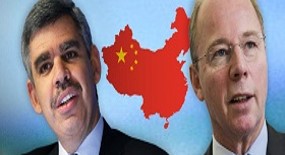As leaders from the world’s wealthiest countries gather in China for the G20 Summit, Mohamed A. El-Erian and Michael Heise face off over China’s rising economic power. This is the first part of a two-part series.
China’s role in the international economy is therefore likely to be bumpy. It will depend on whether it is accommodated easily by others, and it will depend on how easily China can reconcile its domestic obligations with its international responsibility. These are not easy questions.
Michael Heise: That’s a very interesting thought. The values and policy principles are going to remain quite different from what we are used to.
Many policy makers in the West don’t really acknowledge that yet. They think that China needs to converge to the West. We have to become accustomed to China having some positions that are different from Western economic values. We’re seeing that right at the present with Chinese companies buying into Western companies, be it pharmaceutical or chemicals or be it IT or robotics as here in Germany, and yet the other way around is rather difficult, that is, for Western companies to invest in China.
China will be a main driver for the world economy for some years. Growth rates should probably decline to somewhere between 5.0 and 6.0 percent in the medium term, perhaps in the next 5 to 10 years, a range were they could be seen as healthy and stable.
The path towards lower growth will probably be more bumpy than smooth as China becomes more exposed to the international markets. It has started to liberalize its financial system, which is positive, but also generates volatility in capital and exchange flows.
China will have to solve some other major problems as well. The aging population will burden the economy down the road. Financing retirement or health services for older people is not easy to cope with, given the fact that China`s per capita GDP is still at a rather low level.
“We have to get used to China having some positions that are different from Western economic values.” – Michael Heise
It does beg the question whether Western orthodox economic policy is a one-size-fits all approach, yet China seems to do quite well not following these orthodoxies, such as with the exchange rate.
Mohamed A. El-Erian: I suspect that, partly reflecting frustration at the unwillingness of the advanced economies to sufficiently accommodate the country in the multilateral system, China has led two initiatives. One is the creation of the new Asia Infrastructure Investment Bank, the AIIB, and the other is the creation of the New Development Bank with other BRICS countries.
So far, particularly in the case of the AIIB, China has worked hard to ensure that the governance element meets high standards. And there is hope that this alternative road that China is taking is in fact consistent with reforming the multilateral system overall, as opposed to fragmenting it. But the jury is still out, and just like on the domestic side, it is something that people are going to be looking at closely. The hope is that this can help act as a conduit for their reform of the international monetary system.
Michael Heise: The Chinese are trying not to follow the demand side policies that Western economies have followed with negative interest rates or quantitative easing. They are critical of that. They do employ fiscal spending policies, but their government deficits are less than in the West. They still have some firepower left.
There are other fundamental differences that won’t go away soon, such as in the principles and laws governing the economic process – the framework for the economy – such as the role of government-owned companies, the openness to international competition and to newcomers, the way credit is allocated. These differences will create some tensions in the coming years.
Few elements of Chinese economic policy have been more politicized than the yuan or the exchange rate.
Michael Heise: The devaluation of the renminbi since mid-2015 has not been a beggar-thy-neighbor policy. It follows many years of appreciation. Now it is in my view a sensible policy choice. China doesn`t have many levers to keep the economy moving at high speed without creating negative side effects. Reducing interest rates or generating more liquidity through monetary policy would make financial excesses get even worse.
Public investment to spur growth would exacerbate the problem of over-capacity in relevant sectors of the economy. So a gradual devaluation of the exchange rate is a natural policy choice. It helps to reflate the economy after years of appreciation. I wouldn’t criticize that and I expect a moderate devaluation of the Yuan to continue. It may not be liked by trading partners, but they will have to adjust.
Mohamed A. El-Erian: The currency is a good example of the tension between China’s domestic obligations and its international responsibilities. From a domestic perspective, China would favor a weaker currency. It’s an important contributor to cyclical growth at a time of major structural changes and a sluggish global economy. So from a domestic perspective, a weaker currency makes sense.
But from a global perspective, a notably weaker currency increases tensions, not only trade and financial market tensions but also when it comes to multilateral efforts to establish the Chinese currency as one of the global reserve currencies. Recall that it has been almost a year since the RMB was added to the IMF currency basket for its SDR.
What is likely to happen is that China will favor a currency devaluation as long as this does not increase global tensions too much; and if tensions rise, the authorities will likely hit the brakes on currency devaluation.
